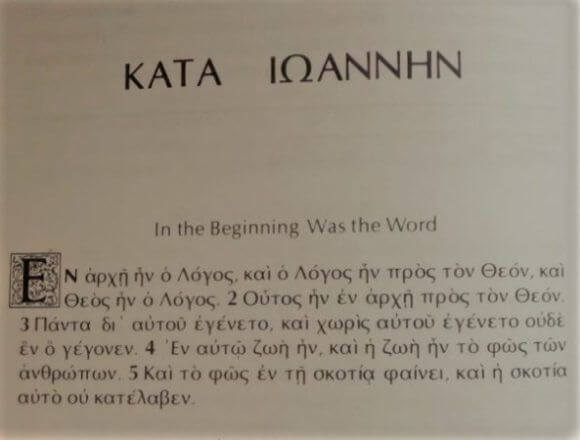The title is actually a misnomer for NT Greek has no indefinite article. But the eye-catching title draws attention to an important subject—how NT Greek handles the expression of indefiniteness. Many assume that the fact that NT Greek has no indefinite article form (equivalent to English a, an) means that NT Greek doesn’t have an indefinite article function. This, however, is a mistake. NT Greek definitely has the ability to express indefiniteness with nouns. It does this in two main ways. The first is the use of the indefinite pronoun τις (tis) “anyone, someone.” The second is the use of the number one, εἷς, μία, ἓν (eis, mia, hen). In short, there are two Greek indefinite forms that handle the same function as the English indefinite article.
Here are two examples using the indefinite pronoun.
John 11:1 — Ἦν δέ τις ἀσθενῶν Λάζαρος ἀπὸ Βηθανίας
— Ἦν [it was] – δέ [new sentence] – τις [anyone, someone] – ἀσθενῶν [being sick] – Λάζαρος [Lazarus] – ἀπὸ [from] – Βηθανίας [Bethany]
— there was – Ø – any one – sick man – Lazarus – from – Bethany
— this is not correct — “there was anyone sick, Lazarus from Bethany”
— this is not correct — “there was any one sick, Lazarus from Bethany”
— this is mediocre — “there was someone sick, Lazarus from Bethany”
— this is proper English — “there was a sick man, Lazarus from Bethany”
— this is acceptable too — “a man was sick, Lazarus from Bethany”
Luke 14:16 — Ἄνθρωπός τις ἐποίησεν δεῖπνον μέγα
— Ἄνθρωπός [man] – τις [anyone, someone] – ἐποίησεν [he made] – δεῖπνον [feast] – μέγα [great, big]
— man – any one – made – feast – great
— this is stilted — “anyone man made a big feast”
— this is stilted — “any one man made a big feast”
— this is not right — “a certain man made a big feast” (this adds an element of definiteness missing in the Greek)
— this is the correct sense — “a man made a big feast”
Principle: As a general rule, when the indefinite pronoun doesn’t make sense translated as an indefinite pronoun, try translating it by the indefinite article.
Here are two examples using the number one.
Matthew 8:19 — Καὶ προσελθὼν εἷς γραμματεὺς εἶπεν αὐτῷ
— Καὶ [and] – προσελθὼν [having come] – εἷς [one] – γραμματεὺς [scribe] – εἶπεν [he said] – αὐτῷ [to him]
— and – came – one – scribe – he said – to him
— this is stilted English — “one scribe came and said to him”
— this is good English — “a scribe came and said to him”
Matthew 26:69 — καὶ προσῆλθεν αὐτῷ μία παιδίσκη
— καὶ [and] – προσῆλθεν [she approached] – αὐτῷ [to him] – μία [one] – παιδίσκη [servant girl]
— and – she approached – to him – one – servant girl
— this is poor English — “and one servant girl approached him”
— this is good English — “and a servant girl approached him”
Principle: As a general rule, when the number one doesn’t make sense translated by the number one, try translating it by the indefinite article.
Observation — This really isn’t as strange as it may sound to your ears. The English indefinite article an comes from an old form of the English number one.
Observation — Languages don’t need a full-fledged indefinite article to express what English expresses with the indefinite article.
NOTE — Thayer says on this point, “the numerical force of εἷς is often so weakened that it hardly differs from the indefinite pronoun τις or from our indefinite article.
“Eyes wide open, brain engaged, heart on fire.”
Lee W. Brainard
Scripture citations are from —
[The New Testament in the original Greek: Byzantine Textform 2005, with morphology (2006). — Logos Bible Software.]




2 Comments
Angela
January 25, 2024 at 10:03 pmThe ESV translation of 2 Peter 1:11 uses “an” that is awkward, as it makes it appear that you have “do” veres 1:5-10 in order to enter the kingdom of heaven; whereas the Berean Standard and NIV translate it better, as your welcome into the kingdom will be lavish or rich. What are your thoughts on this?
Lee Brainard
April 11, 2024 at 7:23 pmThe King James also has “an.” The Greek has a definite article. Whether translated with an indefinite article or not, there is nothing about us having to do something to gain an entrance.